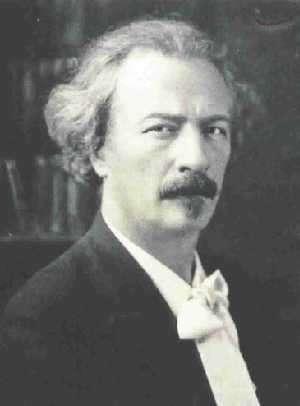 SKC Films Library SKC Films Library |
|
|
| SKC Films Library >> Musics >> Biography: Musicians |
 Ignacy Paderewski Ignacy Paderewski[pah deh rehf' skE] pianist, composer, statesman Ignacy Jan Paderewski was born in Kurylowka, Podolia (now part of Ukraine), on November 6, 1860. He began piano lessons at the age of six, entered the Warsaw Conservatory at twelve, and was appointed a professor of piano at the Conservatory at eighteen. His first published composition, Impromptu for Piano, appeared in the journal Echo Muzyczne in 1879. In 1880, Padewerski married Antonia Korsak, one of his pupils. She died giving birth to son Alfred the following year, after which Paderewski became even more focused on music. After studying music composition in Berlin, Germany, he moved to Vienna, Switzerland, where financial support from Polish actress Helena Modrzejewska (Modjeska) allowed him to receive private piano lessons from Theodor Leschetizky. He began his concert career in Vienna in 1887, and was soon one of the most popular concert pianists in Europe. He made his American debut in 1891, giving 117 recitals in 90 days, beginning in New York City. In 1897, Paderewski bought an estate about 60 miles southeast of Kraków. He married Helena Gorska, Baroness von Rosen, in 1899, and bought an estate on the outskirts of Morges, Switzerland, overlooking Lake Geneva, the following year. Alfred Paderewski, who had been an invalid since birth, died in 1901, the same year that Ignacy Paderewski's only opera, Manru, debuted in Dresden. He became director of the Warsaw Conservatory in 1909, the same year his Symphony in B Minor, Op. 24 (a musical tribute to the history of Poland) was debuted by the Boston Symphony Orchestra. A staunch advocate for Polish independence, Paderewski used some of his accumulated wealth in 1910 to present the city of Kraków with a monument commemorating the 500th anniversary of the victory of the Poles over the Teutonic Order. Just before World War I broke out in Europe, Paderewski bought two ranches in central California, on which he planted almond trees, fruit orchards, and Zinfadel grapes. By 1916 he owned over 5,000 acres, almost all of which generated some kind of income. Although he was now living in the United States, he continued to be an advocate for Polish independence. He gave concerts to raise funds for Poland, helped enlist men for the Polish Army, and served as the U.S. representative to the Paris-based Polish National Committee. He also persuaded President Woodrow Wilson to make an independent Poland the thirteenth of his Fourteen Points. After Poland achieved independence in 1919, Paderewski was appointed by Polish President Józef Pilsudski as its Prime Minister and Minister of Foreign Affairs. He subsequently represented Poland at the Versailles Peace Conference, and it was partly through his influence that Poland regained most of the territory it had lost prior to and during the war. His efforts on behalf of Polish independence did not help Paderewski's government gain popular support, however, and he resigned from both of his offices after just ten months and became Poland's ambassador to the League of Nations. Paderewski retired from politics and resumed his music career in 1922. Although he had been absent from the concert stage for several years and was now in his sixties, Paderewski had not lost any of his musical skill, nor had his concert audiences lost their enthusiasm. He continued to perform until suffering a mild heart attack in 1939, after which he returned to his Swiss estate. After Nazi Germany invaded Poland a few months later, Paderewski personally asked the League of Nations to intervene on Poland's behalf. His appeal fell on deaf ears, however, and Paderewski was asked to head the Polish National Council in exile. Although he accepted the title, Paderewski chose to work from his California ranch rather than Europe. Paderewski was in the midst of a concert tour to raise funds for Poland when he died in New York City, on June 29, 1941. U.S. President Franklin Delano Roosevelt authorised Paderewski's temporary burial at Arlington National Cemetery until such time as his body could be returned to his homeland. That return finally happened on June 29, 1992, when he was given a state funeral at St. John's Cathedral in Warsaw. INTERNET SOURCES SEE ALSO |
SKC Films Library >> Musics >> Biography: Musicians This page was last updated on 01/18/2017. |